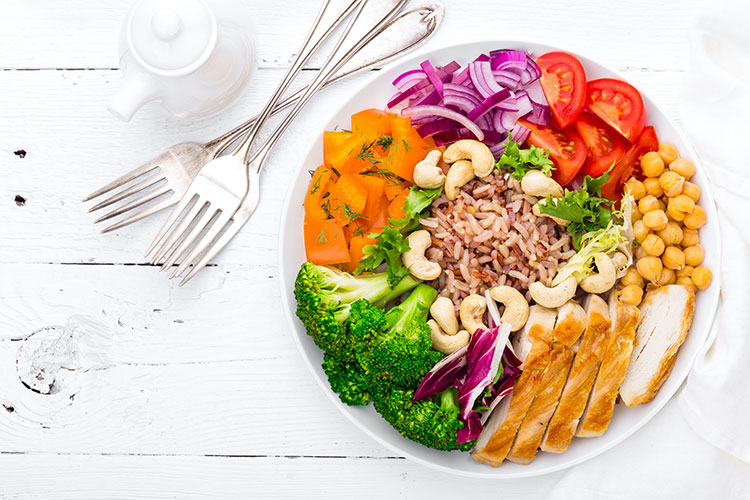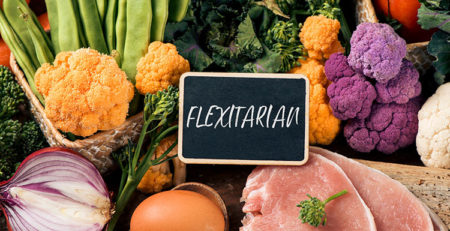We know DIETS DON’T WORK! The short and skinny: food plans lead to “Yo Yo”dieting which can make you gain more weight than you lost in the first place! (It’s called “weight cycling.”) This can harm your health more than just staying put at a higher weight. So why risk it? Not to mention the psychological toll dieting can have on you. When diets fail, dieters often feel ashamed and demoralized. Binge eating or other eating disorders can sometimes develop as well.
We also know diets don’t work because forbidden fruit is sweeter, and as soon as you go on a diet your favorite junk foods are top of mind! But If diets don’t work, what does? Here are my top ten NON-DIET tricks of the trade, after decades of counseling patients who have tried and failed to lose weight the “Die with a T” way:


#1) Radio Eating. That includes Spotify, Apple Music, you get the idea. Instead of watching TV or a video on your phone, instead of reading… listen to music while you eat. Reading or watching TV will hypnotize you and make it difficult to notice when you’re satisfied. Getting the most mileage out of each bite requires mindfulness. Music enhances digestion and keeps you from feeling too bored without distracting you into mindless overconsumption. (Exception: I just met with a patient who uses the TV to pace his eating! He used to finish a meal in five minutes, and now uses the TV to extend his meal to 24 minutes. He only eats during the commercials! Hey whatever works!)
#2) Say goodbye to the bathroom scale. It is a useless, arcane measurement of health and will mess with your head time every time. You’ll know your weight has changed when your clothes fit differently. This one is hard…. and may require the help of a registered dietitian with experience in the non-diet approach. But it is worth it and necessary.
#3) Eat “soul food.” Junk food in moderation can be good for your soul. I’ll never forget going out and buying M & Ms for a patient at the Rader Institute for Eating Disorders. This bulimic needed to experience eating her favorite junk food without binging or purging. As mentioned in my last article, one of my patients lost 100 pounds eating a candy bar every day! Message: eat that food you really want. Getting a modest amount of a food you crave makes it easier to portion control your other meals and snacks. And it helps to avoid the trap of eating everything but the kitchen sink until you finally get satisfaction with what you’re craving.
#4) Try not to skip lunch. If you must skip lunch, then at least eat a balanced snack before dinner which contains some protein and fat- such as a piece of cheese and a small apple, or one-fourth cup raw almonds and half of a banana.
#5) Get in touch with your hunger and fullness. Many of us don’t know if we’re actually hungry or not! We ignore our hunger, or we eat when we’re not hungry. Rate your hunger from 1-4: 1 is starving and 4 is barely hungry. Many of my patient’s associate being satisfied with being stuffed. Imagine your stomach is a Ziploc bag. Is it stuffed full? Did you ignore the little “click” that said you were satisfied when your stomach was 2/3 full? Give your fullness a number between 6 and 10. 6 is barely starting to be satisfied, and 10 is uncomfortably stuffed. Five is neutral-neither hungry nor full. You might not know the number- but checking in is therapeutic and will get you there eventually.
#6) Be a “Chew Chew Train”. Try and chew each bite 25 times. Yes, you read this correctly! Doctor Fletcher cured many complex gastrointestinal disorders in the early 1900s doing nothing but getting his patients to chew. It’s also a great technique for slowing down your eating pace. So much of our digestion takes place in the mouth.
#7) Strive for balance and feeling good. Are you tired an hour after finishing your meal or snack? Energized? How do you feel after several days of balanced eating? (NOT perfect eating!) Feel the difference between eating balanced meals with mostly whole foods versus eating the majority of your meals made up of processed foods high in salt, fat and sugar. Again, one small treat every day can still be a part of a healthy lifestyle. It’s about balance-NOT perfection! Use the plate method to balance your meals, and don’t be afraid to have some fat with your meals to promote satisfaction.
#8) Wasting food is cheap therapy. Many people were raised to finish their food. Wasting food is a guilt-inducing practice for many. But when you realize that It’s truly OK to throw food away, you are experiencing cheap therapy! Overeating will never solve world hunger.
#9) Tune into your likes and dislikes. If you don’t love something, don’t eat it. If you love something, savor it with your full attention.
#10) Movement is Medicine. Move your body at the level you feel comfortable-whether that includes gentle yoga, a slow walk or running a marathon.
Sheri Weitz, RDN, CDE is a Registered Dietitian, functional nutritionist, diabetes specialist and lifestyle coach with a private practice in Los Angeles. If you are interested in nutrition counseling using the non- diet approach, or to find out how food sensitivities and functional nutrition can affect your health, contact Move to Wellness for a free consultation: Sheri@MovetoWellness.net or visit www.MovetoWellness.net.












